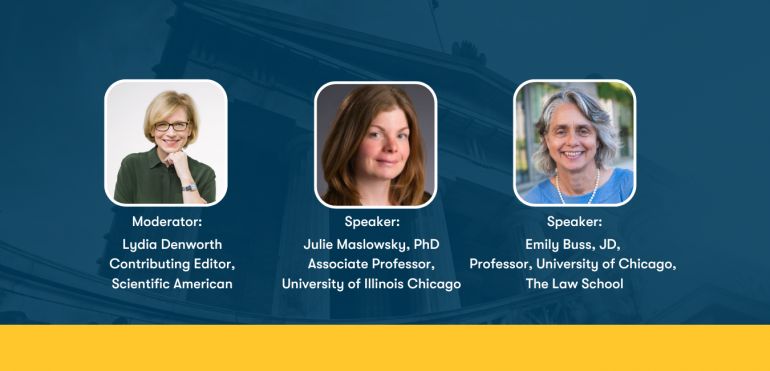“What is society’s obligation to adolescents, and how does that translate into rights?” asked science journalist Lydia Denworth, kicking off the fourth, and final, discussion at our second annual Adolescent Brain Development Symposium. Guest speakers Julie Maslowsky, PhD, Associate Professor at the University of Illinois Chicago, and Emily Buss, JD, Professor at the University of Chicago Law School, joined us to discuss.
“When we talk about rights for children, we mean, generally, something of value to children afforded through law,” Emily explained. “But, autonomy rights are a special category of rights—rights that protect children’s ability to make their own decisions about matters of importance.”
“Autonomy rights” refer to the human rights of people, in this case adolescents, to make choices for themselves that affect their own lives. As we mature, we increasingly view personal matters—such as decisions about our appearance and friendships—as areas that should be under our own control. Having a sense of agency and autonomy are essential to successful adulthood, as we learn to regulate our emotions, form and express our own opinions and manage our own health, finances, and careers.
“We have data to support that adolescents are able to make these kinds of decisions,” said Julie. “We know in our decision-making frameworks that these are reasoned decisions, that they can process risks and benefits.”
Laws regarding adolescent autonomy rights should consider not only youths’ capacity for decision making, but also how we are setting up young people for a positive future—supporting them with accurate information in the process of making a decision at a medical clinic, for example. “If we think about what we’re trying to do, it’s to build young people’s abilities to grow up to be effective exercisers of autonomy rights as adults,” said Emily. “One of the things along the way that is going to be really important is that they can access information.”
Regulations that limit adolescents’ ability to consent to participating in research studies result in a lack of information and evidence regarding youths’ sexual and reproductive health.
“As I spend more and more time with clinicians, with advocates, I really see the necessity of the human rights framework,” said Julie. “I think a lot about the right to bodily autonomy, which is hard to legislate, but must be recognized as a human right.”
Research suggests that youth under 18 are as knowledgeable about changing abortion laws and the implications of these changes as older people. They may see information on TikTok, but they vet it on .gov or .edu websites, they ask their doctor, they go to other reliable sources.
Unfortunately, reforms that limit adolescent autonomy rights disproportionately impact black and brown youth, undocumented youth, youth with disabilities, and youth living in states where they already have a weaker social service network. Discrimination and lack of resources prevent these young people from accessing creative work-arounds that more privileged youth can employ.
“We also have to value autonomy, nurturing our adolescents, and providing opportunities that support their human rights,” said Julie.
Key Takeaways
- “Autonomy rights” refer to the human rights of people, in this case adolescents, to make choices for themselves that affect their own lives.
- Laws regarding adolescent autonomy rights should consider not only youth’s capacity for decision making, but also how we are setting up young people for a positive future, supporting them through accurate information in the process of making a decision at a medical clinic, for example.
- Regulations that limit adolescents’ ability to consent to participating in research studies result in a lack of information and evidence regarding youths’ sexual and reproductive health.
- Reforms that limit adolescent autonomy rights disproportionately impact black and brown youth, undocumented youth, youth with disabilities, and youth living in states where they already have a weaker social service network. Discrimination and lack of resources prevent these young people from accessing creative work-arounds that more privileged youth can employ.
- Research suggests that youth under 18 are as knowledgeable about changing abortion laws and the implications of these changes as older people. They may see information on TikTok, but they vet it on .gov or .edu websites, they ask their doctor, they go to other reliable sources.


